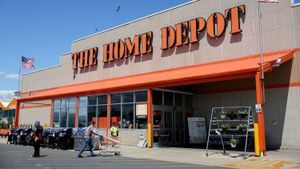Britain's retail sector is buzzing with significant unease following the recent budget announcement from the new Labour government, which retailers warn could lead to increased costs for consumers and job losses across the industry. Over 80 CEOs from major retailers, including well-known names such as Tesco, Boots, and Marks & Spencer, have banded together, voicing their concerns through the British Retail Consortium (BRC).
According to this coalition of industry leaders, the measures introduced could add up to £7 billion to annual operating costs by 2025. With rising costs already creating strain, they find the latest budget proposals especially troubling. The chancellor not only increased the national living wage but also raised employer national insurance contributions, pushing businesses to their financial limits. “For any retailer, large or small, it will not be possible to absorb such significant cost increases over such a short timescale,” the letter sent to Finance Minister Rachel Reeves warns.
The retail executives argue the budget’s effects could directly lead to higher prices for consumers, reduced pay raises, and potential job cuts at the entry-level. They cite the growing pressure on profit margins, stating, "The sheer scale of new costs and the speed with which they occur create a cumulative burden… job losses are inevitable, and higher prices are certain." Nick Stowe, Chief Executive of Monsoon and Accessorize, echoed these sentiments, observing, “We’re faced with the choice of protecting staff numbers or cancelling our investment plans.”
This precarious scenario has already prompted some businesses to discuss difficult decisions. Retailers are becoming increasingly cautious as they weigh their options on how best to manage the added financial burden without compromising their workforce.
Adding fuel to the fire, the BRC’s estimates claim retailers will face £2.3 billion from the forthcoming rise of national insurance from 13.8% to 15%. This, combined with the reduction of the earnings threshold from £9,100 to £5,000, doesn’t just hit large chains but significantly impacts businesses reliant on part-time and entry-level roles.
The situation has worsened with luxury brands, like Mulberry, reporting dismal market performance, particularly due to low consumer confidence, and implementing plans for job cuts. It's clear the budget is creating ripples; even major supermarket chains like Morrisons and Sainsbury’s have added their names to the complaint.
Recent months have seen retailers grapple with inflation and shifted consumer spending habits, making them particularly sensitive to this budget's new financial demands. Critics are challenging the government, arguing the fiscal measures seem contrary to plans for economic growth. Some believe these changes will result not only in job losses but also slow investments and retail expansions.
Prime Minister Keir Starmer's administration has defended these measures as necessary to address the economic instability inherited from previous governments. Yet, as union representatives voice concerns, industry leaders are sounding alarms about the potential consequences for the retail sector and the communities it supports. Graham Smith, General Secretary of the GMB union, labeled the retailers' warnings as "utterly pathetic," calling for businesses to innovate rather than retreat.
For many, the severity of the budget's impact cannot be overstated. Stakeholders are contemplating how these substantial cost increases will reshape the retail environment, affecting everything from employment rates to the affordability of goods.
The BRC is pushing for a dialogue with the Treasury, seeking solutions such as phasing the introduction of the lowered earnings threshold for national insurance and delaying the packaging levy’s enforcement. They insist action is needed before these measures are fully implemented to prevent detrimental effects on the workforce and prices.
Today, during testimony before the Treasury Committee, Andrew Bailey, the governor of the Bank of England, confirmed retailers' assessments, stating they correctly identified the risks associated with the latest national insurance increases. He emphasized, "The rise…represents increased costs for employment, likely resulting in higher prices, lower wages, and job cuts." The looming question remains: can the industry withstand these changes without collapsing? And how will these decisions play out for the average consumer?
With rising tensions between government officials and retail executives, all eyes are on the decisions made moving forward. If retailers cannot sustainably adjust to the financial pressures inflicted by the new budget without sacrificing jobs or inflaming prices, the balance of Britain's economic recovery may hang precariously in the balance.



